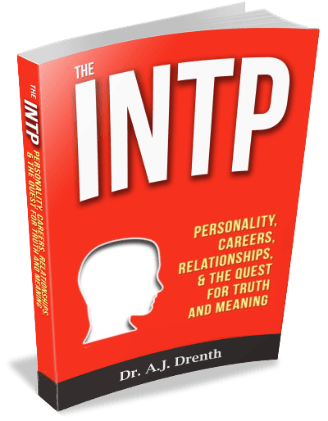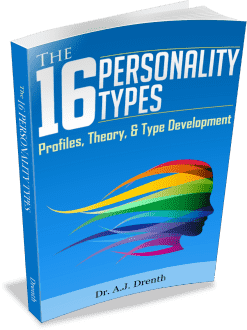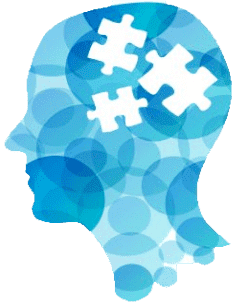
Without question, there are fundamental INTJ – INTP personality differences that shouldn’t be overlooked or brushed over. But we also can’t dismiss the myriad similarities between these two types. Despite employing different cognitive functions, their Introversion, in combination with Thinking (T) and Intuition (N), contributes to substantial overlaps in their behavior as well as the overall direction of their personality development.
INTPs and INTJs (“INTs” for short) typically exhibit a pronounced intellectual bent. In psychological parlance, they show high levels of “typical intellectual engagement” (TIE) and “need for cognition” (NFC). This may include a penchant for armchair philosophizing, intense intellectual discussions, wrestling with complex intellectual problems, and actively seeking out new knowledge.
But as INTs go further down the cerebral rabbit hole, they increasingly emphasize and identify with their intellect at the expense of everything else. Keeping raw experience and instinct at arm’s length, they become exceedingly conceptual and calculating. Thus their reputation for appearing a bit stiff or mechanical in their dealings with others.
One of the more interesting frameworks of human psychology is the Cognitive Experiential Self Theory (CEST), which posits two primary modes of cognition: rational and experiential. If it’s true that INTs are predominantly “rational” operators, then the suppressed side of their personality might well be conceived as “experiential.”
Similarly, Jungian theory espouses that INTs’ Sensing (S) and Feeling (F) functions are apt to be underdeveloped. By habitually viewing life through a conceptual (NT) lens, INTs may downplay or neglect the sensory, physical, and emotional aspects of life. Occasionally, they may find themselves envying types like the ESFP who engage with life in a more experiential and instinctual fashion.
The essential problem for INTs, if you’ll allow me to frame it as such, is they spend too much time in their own heads. While this certainly promotes cognitive and intellectual development, it’s not without side effects, namely, the atrophy of other parts of their personality. It can also engender a sense of isolation and disconnectedness from the body, emotions, other people, and the concrete world.
Just to be clear, I’m not suggesting that INTs completely forsake their rational nature in favor of SF experience. We’re not dealing with an either-or question here. The truth is that operating exclusively in SF mode would do nothing but create a perceived deficit of NT for these types.
There’s also a developmental component to consider. Namely, INTs may need to find career success or otherwise exhaust their rational ambitions before turning their sights to other forms of personal growth. They must establish a path and identity (i.e., self-definition) before feeling ready to let go and explore other parts of themselves (i.e., self -expansion). Broadly speaking, personality development assumes an hourglass shape. In childhood, our personality can be viewed as broad insofar as it’s amorphous and undefined. As the dominant function emerges and we enter adulthood, our personality converges to accommodate a specific identity and set of roles. Finally, as we approach mid-life, the urge for self-expansion begins to surface, prompting a relaxation and broadening of the self.
There are numerous activities that can help INTP and INTJ types expand beyond their typical cerebralism. Here are some examples:
- Yoga, meditation, etc.
- Exercise, dancing, and physical activity generally
- Games and sports
- Art and entertainment
- Hands-on work
- Sex and relationships
All of these activities prompt a relaxing of the intellectual faculties, opening the door to greater immersion in, and appreciation for, sensory and affective experiences.
Reconciling the Rational & Experiential, Consistency & Change
In his classic work, Psychological Types, Carl Jung takes an in-depth look at the German poet-philosopher, Friedrich Schiller, whom Jung casts as an INT type. In particular, Jung focuses on Schiller’s struggle to reconcile his thinking (NT) self with his sensuous (S) and feeling (F) side.
Schiller believed that an individual should establish and maintain a consistent self-concept and worldview (INT), irrespective of changing feelings and circumstances (ESF):
To remain constantly himself throughout all change, to turn every perception into…the unity of knowledge, and to make each of his manifestations in time a law for all time, that is the rule which is prescribed for him by his rational nature…Man conceived in his perfection would accordingly be the constant unity which amidst the tides of change remains eternally the same.
Schiller proceeds to describe sensation as “merely filled time,” suggesting that “personality is extinguished so long as sensation rules.” Assuming that other INTs have a similar view of sensation, the activities I listed above might feel threatening to those concerned about losing themselves (i.e., their conceived identity and sense of rational control) in the world of raw sensation or feeling.
While Schiller is clearly inclined to subordinate the chaotic world of feelings and sensations to the governing power of fixed rational concepts, he eventually stumbles onto a rather serious problem with this approach:
There is really no means of preserving the unity in man except by the absolute subordination of the sensuous instinct to the rational. But the only result is mere uniformity, not harmony, and man still remains forever divided.
Here Schiller highlights a key concern for INTs: How does one maintain rational consistency while at the same time remaining open to the messy world of feelings and sensations? Schiller realizes that rational consistency comes with a cost, namely, psychological division and dissatisfaction.
In seeking a solution to this problem, Schiller, in true INT fashion, begins by framing the issue conceptually:
The object of the sensuous (S) instinct…may be called “life” in its widest meaning; a concept that signifies all material being and all that is directly present to the senses. The object of the formal instinct (NT) may be called “form,” a concept that includes all formal qualities of things and all their relations to the intellectual faculties.
Schiller then combines these two “instincts” under the concept of “living form,” which serves as a provisional synthesis of the sensuous and formal. He describes living form as “all aesthetic qualities of phenomena… what we call beauty in the widest sense.” He goes on to propose a third instinct—the play instinct. According to Jung, if play were to serve as a mediating function between the sensual and formal, it should bear “no resemblance to the two opposing functions, but stand between them and do justice to both their natures.”
Jung also notes that play might serve as a counterbalance to Schiller’s characteristic seriousness. On the whole, I think it’s fair to say that INTs, as rational types, tend to be rather serious folks. They take seriously the quest for truth and aim to subject themselves to rational principles. Many also exhibit a strong work ethic and orientation. I therefore agree with Schiller and Jung that cultivating a playful spirit is certainly part of the solution for INTs. Indeed, many of the personality-balancing activities I mentioned earlier—games, sports, art, entertainment, etc.—are best approached with a playful attitude. Again, I’m not proposing a complete abrogation of seriousness. Ideally, INTs would be capable of shifting between playfulness and seriousness in accordance with the situation.
So how can INTs do a better job of shifting their attitude and avoid getting locked into a single mode of operating?
Jung’s Proposed Solution
According to Jung, the solution involves a withdrawal of libido (i.e., energy) from whatever function is being used, allowing the libido to flow back into the subconscious. The subconscious can then reallocate that energy in a manner most conducive to both the inner and outer circumstance. Jung sometimes refers to this process as the “transcendent function,” which he saw as overseeing the health and balance of the psyche.
For INTs, this process requires a willingness and ability to detach from the intellect and its constructs. This can be accomplished inwardly through practices like meditation—which promote detachment from rational thought—or outwardly through activities like exercise, games, or physical work. Temporarily withdrawing energy from the intellect affords the subconscious an opportunity to redistribute it in a more optimal manner. By periodically hitting the pause button on the intellect, INTs help ensure that they are not just masters of “form,” but also remain connected to the unique contents of “life” by way of their S and F functions.
Learn More about INT Types in Our Books
Learn more about INTPs and INTJs—their personality, cognition, life struggles, and much more—in our books:
The INTP: Personality, Careers, Relationships and the Quest for Truth & Meaning
The 16 Personality Types: Profiles, Theory & Type Development
Unsure if You’re an INTP or INTJ?
Take Our “INTJ-INTP Type Clarifier” Test



Mohamed says
Nice post!
A.J. Drenth says
Thanks Mohamed. Glad you enjoyed it.
Lil says
INTJ here. This winter, I did something slightly irrational: I bought skis, having not skied in 25 years. Spending the money forced me to use them. It turns out, skiing is not like riding a bike, and I did forget how to do it. I was scared to death, and it took all my brain and consciously-developed feeling skills to do it. I realized about three days in that I assumed that other people were good at physical activities but that I wasn’t – but this also is an irrational thought. The difference is just practice. So I kept practicing, and used my intellect to guide this journey. I knew from all my intellectual knowledge of how learning works that I had to set small, achievable goals, recognize even the smallest successes, seek out help from more experienced people in real life, and also use reading materials and videos to practice form and technique. I also knew from learning many intellectual things that I love the learning curve from ignorance to mastery, and that I would likely experience a physical learning curve the same.
When I started, I was scared of the flattest, easiest green trails, and any other hills terrified me at the top so that I would not even try. Long story short, by the end of the winter, I was skiing all the blues with grace, and some of the blacks, too. I was no longer scared of the hills, and I developed my technique so that I was not embarrassed by how I looked. I also lost 20 lbs and got amazing lower body muscles and look pretty great, and it was fun doing it!
What’s my point? Don’t shy away from the physical. Pick something that scares and challenges you. Use the frustrations of learning to expand your emotional range, and watch yourself as a curious observer. And remember that intelligence applies across all domains. I used my intellectual bent to attack a physical problem, and it worked!
A.J. Drenth says
Hello Lil, Thanks so much for sharing your personal experience and insights. Good stuff!
Angela (Shengxi) says
I’d agree this is a quite insightful post for INT, as an INTJ I found it relatable.
Based on personal experience and observations, at the current stage of my life it seems I’m struggling hard to accommodate the extraverted demands both from the external environment and internal psychological development towards a “wholeness”.
I haven’t done serious readings on Schiller, but on remarks of Jung’s solution and my background interest in psychoanalysis, the formulation on libidinal distribution sounds conceptually plausible. It would be great if can hear more from an experimental perspective on this.
Thanks for the quality post.
A.J. Drenth says
You’re welcome Angela. Thanks for your comment and feedback.
Colleen says
I’m an INTJ but it took me a while to really own that result as I was never satisfied I was achieving enough in school to deem myself ‘clever’. I work as a graphic designer and because of my creative leaning, I often thought myself more likely an INFJ or an INFP. But if I am honest, I always approached my art in a very rational way. It is therapeutic to read about, and puzzle, things like colour theory or proportion. I often struggle to catch on to trends and the tastes of most people, my manner is a little stiff. But I am starting to branch out. I enjoy gardening and doing some DIY. It is physical but there is still some problem solving involved.
Andy says
INTP here and must say this article resonates deeply with my life as of late. I am a firefighter and about three years ago I was promoted to a battalion chief which means leaving a crew on a fire truck and becoming a semi officer worker overseeing a shift. No longer do I cut up with the guys, get physical and sweaty in bunker gear, or just hang out and let my mind wander. I know INTP’s are not the best fit for hierarchical structured jobs, but the free time in this job is amazing.
Fast forward to now, I am now working all day long with tons of responsibility and I have gotten stuck in rational mode to make sure all is accomplished. This has been at the detriment of my personal life. People say I am no longer fun, I treat my home life as a puzzle to be solved and not with the emotion needed to have a successful relationship, and my sex life has suffered. Thankfully I have a very dedicated partner who has been hammering me on these things, and through lots of reading and thinking (isn’t this the problem in the first place) I have been able to understand what has happened.
Like Lil states, physical activity has been very important to getting my head straight. In my case, there is something about the nature of hard physical activity that allows one to detach from thinking. This has been such a positive that I am building a garage gym so I don’t have to go to a commercial gym and bounce off other people for an hour-and-a-half.
AJ and his books have been a huge help as well, and I thank you for them.
Ralph says
How do you reconcile the fact that Schiller in Sturm und Drang was at the forefront of change with a totally new worldview as part of the Enlightenment? The enlightenment, and in German literature the Sturm und Drang, developed an absolutely new self-concept and view of humanity compared to the baroque that was before.
Did Schiller say those words towards the end of his life when classicism and romance where leaning back to the old understanding to defend the newly found self-concept of the enlightenment?
A.J. Drenth says
Good question Ralph. Unfortunately, I don’t know the answer. German history, while certainly fascinating, is not my area of expertise:) The post simply drew on material presented in Jung’s book, Psychological Types.